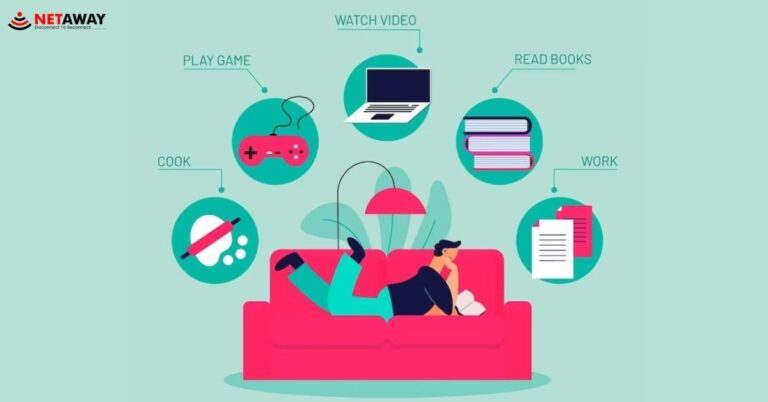
Living in a world of constant connectivity brings both benefits and challenges. One major challenge is internet addiction, which can harm our overall well-being. In this blog, we will delve into the concept of internet deaddiction and offer practical tips to achieve a balance between our online and offline lives. By implementing these strategies, we can regain control over our internet usage and improve our quality of life. We’ll explore the importance of setting boundaries, finding alternative activities, seeking social support, and practicing self-discipline.
It is essential to recognize the impact of excessive internet use on our mental and physical health. By following these tips, we can break free from internet addiction, reconnect with the real world, and enjoy a healthier, more satisfying life. Let’s embark on this journey toward digital well-being together.
Understanding Internet Addiction
Internet addiction refers to the excessive and compulsive use of the Internet that interferes with daily life activities. It can manifest in various forms, such as excessive social media browsing, online gaming addiction, or constant need for internet-connected devices. The allure of the internet can be overpowering, leading to neglect of responsibilities, strained relationships, and a decline in overall well-being.
Recognizing the Signs of Internet Addiction
Identifying the signs of internet addiction is crucial for initiating the process of de-addiction. Some common indicators include neglecting personal hygiene, neglecting work or studies, withdrawal symptoms when not using the internet, and preoccupation with online activities. Additionally, increased irritability, mood swings, and a decline in social interactions may also be observed.
Tips for Internet Deaddiction
Identify triggers and develop coping strategies, create a designated tech-free zone, practice mindfulness and self-reflection, set achievable goals, and engage in physical exercise to break the cycle of internet addiction. Here are some tips for internet addiction:
- Self-awareness and Setting Goals
Begin by reflecting on your internet usage patterns and identifying areas that require improvement. Set realistic goals for reducing your internet time and outline specific activities or hobbies to replace excessive screen time.
- Establish Boundaries
Create a schedule that designates specific times for internet usage, and strictly adhere to it. Establish “no-device zones” such as bedrooms or mealtime areas to promote quality interactions and relaxation.
- Digital Detox
Periodically disconnect from the internet completely. Take breaks from social media, emails, and other online platforms to rejuvenate and reconnect with the real world. Utilize this time for self-reflection, engaging in physical activities, or spending quality time with loved ones.
- Find Offline Hobbies
Discover and develop interests and hobbies that don’t involve the Internet. Engage in activities like reading books, playing a musical instrument, painting, gardening, or outdoor sports. These hobbies can provide a sense of fulfillment and improve overall well-being.
- Practice Mindfulness
Adopt mindfulness techniques to stay present and focused on the task at hand. Engage in activities mindfully, whether it’s having a conversation, eating a meal, or enjoying nature. By being fully present, you can reduce the urge to constantly seek stimulation from the internet.
- Foster Real-Life Connections
Invest time in building and nurturing relationships offline. Prioritize face-to-face interactions with family, friends, and colleagues. Plan activities together, such as going for walks, having meaningful conversations, or participating in group events.
- Limit Notifications and App Usage
Minimize distractions by disabling unnecessary notifications on your devices. Set specific time limits for app usage and avoid mindlessly scrolling through social media feeds. Utilize productivity apps that track and restrict your time spent on specific apps or websites.
- Create a Support System
Seek support from family, friends, or support groups who can provide encouragement and accountability in your journey towards internet deaddiction. Share your goals and progress with them, and ask for their assistance in staying on track.
Conclusion
It is crucial to find a middle ground between our online activities and the real world. Internet deaddiction empowers us to take control of our time and well-being. By incorporating the tips mentioned above, we can make positive changes and lead more fulfilling lives. To start, it’s important to recognize the things that make us excessively use the internet. By identifying these triggers, we can develop effective ways to deal with them. Creating specific times or places where we disconnect from technology can help us establish boundaries and reduce our reliance on it.
Practicing mindfulness and self-reflection is key. Taking the time to be present, understand our thoughts and emotions, and recognize the impact of excessive internet use on our lives is enlightening. It allows us to make intentional choices and prioritize activities that bring personal growth and meaningful connections. Setting realistic goals and maintaining a balanced routine are essential steps. By dedicating time to offline activities like hobbies, exercise, and spending quality time with loved ones, we can reduce our dependence on the internet.
FAQs
Q1. How can I beat my Internet addiction?
Ans. To beat internet addiction, set limits on your usage, take breaks, engage in offline activities, seek support from friends or family, and consider professional help if needed.
Q2. Is Internet addiction a real thing?
Ans. Yes, internet addiction is a real condition where people have a compulsive need to use the internet, which can negatively impact their daily life and well-being.
Q3. What are the causes of Internet addiction?
Ans. Causes of Internet addiction include easy accessibility, social disconnection, emotional needs, gaming, and online escapism.
Q4. When did Internet addiction become a problem?
Ans. Internet addiction became a problem as more people started using the internet in their daily lives. It grew rapidly in the late 1990s and early 2000s.
Q5. How does internet addiction affect the brain?
Ans. Internet addiction can impact the brain by altering its reward system, leading to changes in behavior, attention, and emotional well-being.
